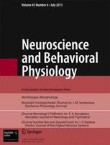
Objectives. To seek neurophysiological predictors of the effi cacy of rhythmic transcranial magnetic stimulation (rTMS) of the left dorsolateral prefrontal cortex in patients with depressive disorders of different nosological categories. Materials and methods. A total of 34 juvenile patients (all male) with protracted treatment-refractory depressive states were studied. Investigation of patients used psychopathological and psychometric methods (Hamilton scale) and electroencephalography. The search for predictors of therapeutic efficacy was carried out using a wide range of neurophysiological indicators and different protocols for high-frequency rTMS (10 and 20 Hz). Results and conclusions. The most significant changes were identified on rTMS at 20 Hz. Favorable treatment effects on the EEG were found to correlate with higher spectral power in the α and β1 subranges.



No comments:
Post a Comment